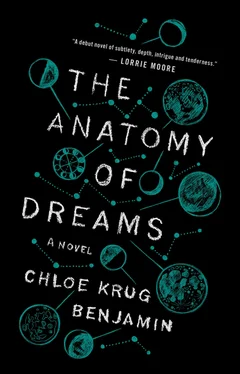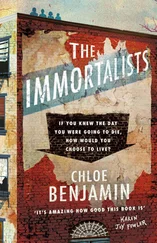“Casserole,” I said. “That’s pretty antiquated, don’t you think?”
But we each harbored the hope that casserole would be delivered to our porch the next morning, that we would all eat together in the dim light afforded by the old dining room bulb. We hoped for the arrival of the Welcome Wagon, something we had heard our parents talk about, as if the Welcome Wagon would drive right out of their generation and into ours. But weeks passed, and we heard nothing from the neighbors, though we spotted them now and then. Evenings, I saw the woman getting out of the Honda, her arms covered in a gray film of dirt. Other times I saw her on the porch, wearing satiny pink shorts and a thin tank top, as if she were lounging in the privacy of her bedroom. She also had an array of little dresses that she wore with the black boots—ruffled miniature things in shades of coral and lime, or stark black-and-white shifts with pointed shoulder pads. But she didn’t seem to go anywhere in them: whenever I saw her coming or going, she was in shorts and a T-shirt, her body covered in that sheer coating of dirt.
In each incarnation, I found her beautiful, though I couldn’t quite say why. Because she never looked our way, I had ample time to study her without fear of eye contact. She had a narrow face with angular bones that rose prominently beneath the skin: high, sharp cheekbones, wide-set eyes, a long nose that pointed toward the line of her mouth. Her lower lip was pierced with a ring, and she had a barbell through her left eyebrow. I had a visceral reaction when I first saw it—a slight clench, as I imagined she did when the needle went through. It gave that brow an appraising, arched appearance that was at odds with the glaze of her eyes.
She walked with an elfin bounce that came from her knees rather than her feet and gave her a look of youthful awkwardness. But her body was a woman’s body. Her height had given her large feet and long, slender legs. She had broad hips and a soft dumpling of a belly. A long tattoo curled up her left forearm, though I was too far away to tell what it was. I knew I could pass for decent looking: I had a narrow build, small features, and brown hair the color of coffee with milk, which had been cut the same way for most of my life. But I was fascinated by the neighbor’s turns and bows, her breasts. They were rounder than mine and emerged from her undershirts in firm slopes, like islands coming out of water.
3. EUREKA, CALIFORNIA, 1998
Janna reminded me of Nina, a Ukrainian girl who transferred to Mills when we were juniors. She and Gabe dated on and off that year. Nina was a tall brunette with large gray eyes and a pursed button of a mouth. She had Janna’s combination of airy nonchalance and unexpected vigilance, something I would see in Janna only later. It was as if she had a number of extrasensory probes, sent out every which way to gather information, while she sat on the porch and feigned disinterest.
Nina’s mother was a celebrated mathematician, and Nina was my biggest competition in statistics. Once Mr. Lee called the two of us up to the board and wrote a logic problem between us. It was meant to be a playful competition, but I could feel myself beginning to sweat as I started in on it.
Nina finished before I had even drawn my truth table. As we were walking back to our desks, she said, “You shouldn’t focus so much on the little details, Sylvie. You’ll miss what’s coming.”
I bristled, but I knew she was right. I had a habit of zeroing in on the specifics to the exclusion of the whole, and I didn’t have very good foresight. That night in November, for instance, when I saw Gabe leaving Mr. Keller’s garden—despite how much it disturbed me, or perhaps because of it, I tried to forget it when Gabe seemed to return to normal. There was a several-week stretch when I found him beside me in bed every morning, and I convinced myself that he must have been sleepwalking, like I’d done as a kid. How could this warm and peaceful body, this person who had become more precious to me than anyone else at school, have done anything so strange on purpose?
That year, we both decided to stay at Mills for Thanksgiving. We were puppyish with infatuation—after a rocky, bitter breakup with David Horikawa, Hannah had started to call us the Moonies—and the idea of eating turkey and canned cranberries with our families was wildly undesirable. I told my parents that the six-hour plane ride was too long for three days at home, with finals just around the corner. Gabe called his mother and received surprisingly immediate clearance to stay, too.
We spent most of that long weekend exploring the woods around campus, the little hill-dips and streams, kissing on Observatory Hill with grass stains on our jeans. We found a pile of dusty board games in one of the common rooms and played deep into the night, betting over who’d win, wrestling for the best pieces. In the dorm kitchens, we cooked ambitiously: stuffing with pecan and thyme, real cranberry jelly that didn’t come from the can. We drove to a nearby market in Hannah’s clunker Honda and got a whole turkey that we roasted and took out too soon, pink juice streaming down its legs. But even this made us laugh.
One afternoon, we walked to the top of Skinner’s Hill, where the Rock Shelter was. It was a massive stone, hollowed out by erosion and open on the inside like a cave. We lay down on the cool, smooth floor. It began to drizzle, then pour. I climbed on top of him. I could feel his erection through his jeans, his belt buckle digging into my stomach.
“Hi,” I said.
“Hi,” said Gabe.
We peeled off our wet jeans, our sweaters, our socks. My body seemed to vibrate, in hunger and in terror; I had only kissed a boy before. I played with the elastic band of his boxers, then put my hand inside to touch him. His body was tight and dense: muscles cabled through his back, and the tendons in his neck rose like a sculpture in relief. He followed me with his eyes as I stripped off my camisole and pulled down my underwear, then his. We fumbled and grasped at the puzzle of sex, the strange angles, Gabe gasping, open-mouthed, when he came; for me, there was only pulsing discomfort, which faded to a dull throb. The next day, in Gabe’s room, I held his chest as he lurched and rocked above me; and then I was the one who was lurching, rocking, tentatively at first and then with a voraciousness I didn’t know I had. We moved together brutally, our teenager’s need as aggressive as it was ravenous, shoving until we seemed less to be having sex than pushing outside our own skins. It was as though there was something to be found beyond sex and we were running for it, clasped together but somehow in competition. Which is not to say it didn’t feel shared; we were together in those moments, the only ones who knew what it was like.
Around this time, I started to have dreams I could barely remember and that left me physically exhausted, as if in them I ran great distances. Once, I woke with a bloody scrape on my left knee. I showed it to Gabe: the scrape glittered red under my desk lamp, as if it were not a wound but a jewel I had been given. I attributed the dreams to sex, both their physical manifestations and their psychological features. I was always exploring a space I never had before—walking across an empty room or through an unfamiliar forest. There were never other people, but sometimes, there were animals. In the forest I saw squirrels whose rustles of movement startled me, but I was most afraid of a cat in the unfamiliar room. It was a small creature, silky and mustard colored and not overtly intimidating, but I felt loathing when I saw it. Often, the cat circled me or pushed against me with its head. Now I think my aversion had more to do with my resentment at being left alone in the room than the cat itself—probably it could sense my fear and was trying to comfort me. But I felt strongly that some wrong had been done in putting me there, and I directed this bitterness at the only creature I could.
Читать дальше












